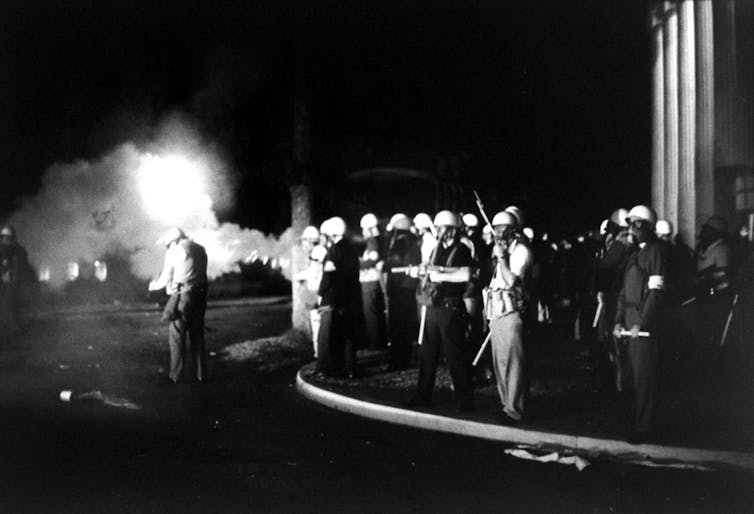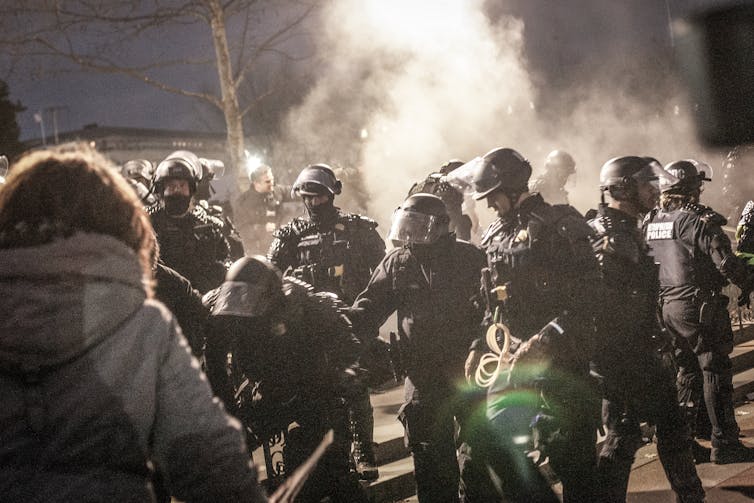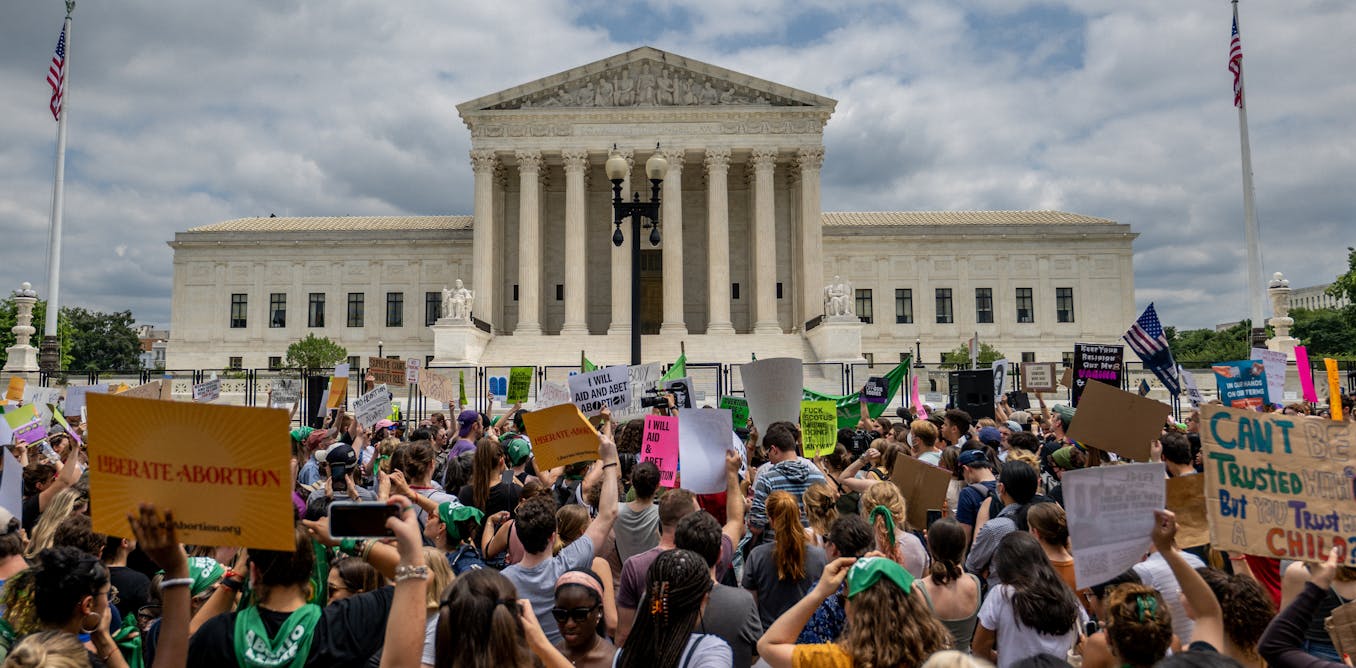Individuals are gearing up to rejoice the Fourth of July, and their ideas are most probable on how numerous scorching canine to invest in for the cookout and whether a family members member desires to go stake out a fantastic place to enjoy the parade and fireworks.
Whilst the holiday break is concentrated on revelry, July Fourth essentially commemorates a solemn minute in the country’s background, when it declared independence from the colonial electricity Good Britain. The institutions of federal government imagined by the founders and their successors about the subsequent many years – among them the presidency, Congress, the departments of State and Treasury, the Supreme Courtroom – have retained their authority and legitimacy for much more than 200 years, weathering troubles from wars both equally internal and abroad and huge financial, political and social upheaval.
But now, the Supreme Courtroom, in the wake of a sequence of highly controversial rulings and moral queries about some justices, is suffering from historically minimal community standing. And that has prompted a countrywide discussion about the court’s legitimacy. It is even drawn exceptional public comment from 3 sitting Supreme Court justices.
What’s referred to by experts as the trouble of “judicial legitimacy” may perhaps look summary, but the court’s faltering community guidance is about a lot more than recognition.
Eroding legitimacy means that governing administration officials and common people today turn out to be increasingly not likely to accept general public procedures with which they disagree. And Us citizens have to have only appear to the rather modern past to have an understanding of the stakes of the court’s increasing legitimacy trouble.
Value ‘paid in blood’
The Supreme Court’s 1954 conclusion in Brown v. Board of Schooling shined a mild on numerous white Americans’ tenuous loyalty to the authority of the federal judiciary.
In Brown, the courtroom unanimously held that racial segregation in public schooling violates the equal security clause of the 14th Amendment. The justices had been abundantly knowledgeable that their final decision would evoke strong feelings. So Main Justice Earl Warren labored tirelessly to assure that the courtroom issued a unanimous, quick and readable feeling created to calm the predicted preferred opposition.
Warren’s initiatives were being in vain. Somewhat than recognizing the court’s authoritative interpretation of the Constitution, lots of white People participated in an extended, violent marketing campaign of resistance to the desegregation ruling.
AP photo
The integration of the College of Mississippi in 1962 gives a pointed example of this resistance.
The Supreme Court had backed a reduced federal court docket that purchased the college to acknowledge James Meredith, a Black Air Force veteran. But Mississippi Gov. Ross Barnett led a extensive-ranging energy to end Meredith from enrolling at Ole Pass up, such as deploying state and regional police to avoid Meredith from entering campus.
On Sunday, Sept. 30, 1962, Meredith even so arrived on the university’s campus, guarded by dozens of federal marshals, to register and start off classes the following day. A group of 2,000 to 3,000 people gathered on campus and broke into a riot. Meredith and the marshals ended up attacked with Molotov cocktails and gunfire. The marshals fired tear gas in return.
In reaction, President John F. Kennedy invoked the Insurrection Act of 1807 and ordered the U.S. Military onto campus to restore buy and protect Meredith. Right away, countless numbers of troops arrived, battling rioters.

Lynn Pelham/Getty Pictures
The violence eventually finished following 15 several hours, leaving two civilians dead – the two killed by rioters – and dozens of wounded marshals and soldiers in addition to hundreds of accidents among the insurgent mob.
The up coming day, Oct. 1, Meredith enrolled in the university and attended his to start with class, but 1000’s of troops remained in Mississippi for months afterward to maintain order.
What some contact “the Fight of Oxford” was fueled by white racism and segregation, but it performed out towards the backdrop of weak judicial legitimacy. Federal courts did not command ample respect amongst point out officers or common white Mississippians to safeguard the constitutional legal rights of Black Mississippians. Neither Gov. Barnett nor the 1000’s of Oxford rioters were ready to abide by the court docket order for Meredith to enroll at the university.
In the close, the Structure and the federal courts prevailed only simply because Kennedy backed them with the Army. But the price of weak judicial legitimacy was paid out in blood.
Legitimacy potential customers to acceptance
In contrast, when people today believe in the legitimacy of their governing establishments, they are far more most likely to take, respect and abide by the principles the governing administration – together with the courts – question them to are living beneath, even when the stakes are substantial and the consequences are considerably-achieving.
For example, two decades back, the Supreme Courtroom settled a disputed presidential election in Bush v. Gore, centered on the counting of ballots in Florida. This time, the court was deeply divided together ideological strains, and its prolonged, challenging and fragmented viewpoint was based mostly on questionable lawful reasoning.

Shay Horse/NurPhoto by way of Getty Photographs
But in 2000, the court enjoyed far more sturdy legitimacy amid the community than it does currently. As a consequence, Florida officials ceased recounting disputed ballots. Vice President Al Gore conceded the election to Texas Gov. George W. Bush, exclusively accepting the Supreme Court’s pivotal ruling.
No Democratic senator challenged the validity of Florida’s disputed Electoral School votes for Bush. Congress accredited the Electoral College’s vote, and Bush was inaugurated.
Democrats were being definitely let down, and some protested. But the court docket was considered as sufficiently genuine to make more than enough acceptance by ample people today to ensure a peaceful changeover of power. There was no violent riot there was no open up resistance.
In fact, on the incredibly night time that Gore conceded, the chants of his supporters gathered exterior tacitly recognized the consequence: “Gore in 4!” – as if to say, “We’ll get you next time, because we believe that there will be a following time.”
Threats forward
But what takes place when institutions fail to retain citizens’ loyalty?
The Jan. 6, 2021, insurrection showcased the outcomes of broken legitimacy. The rioters who stormed the Capitol had dropped religion in methods that undergird American democracy: counting presidential votes in the states, tallying Electoral School ballots and settling disputes more than election law in the courts.
The adult men and ladies who stormed the Capitol might have considered their place was becoming stolen, even if these kinds of beliefs were baseless. So, they rebelled in the encounter of a consequence they did not like.
The menace of more unrest is genuine. Polls present the 2024 presidential election concerning President Joe Biden and former President Donald Trump will be a close call, and it is possible that election results in many states will be challenged in federal courts. Some of these promises might raise good-faith inquiries about the administration of elections, while other individuals progress far more spurious claims intended to undermine faith in the election’s final result.
In the finish, Americans’ faith in the well timed resolution of those people conditions and their peaceful acceptance of the presidential election’s final result will hinge on whether or not the shedding candidate’s supporters take the legitimacy of the Supreme Court docket and the judiciary additional broadly.
Very little is sure in politics, but the specter of constitutional disaster looms more than the United States. It’s dangerously unclear whether or not the Supreme Court docket retains more than enough legitimacy to assure acceptance of choices addressing the upcoming election amongst those people who find themselves on the losing facet. If it doesn’t, the court’s abstract legitimacy challenge could once again guide to violence and insurrection.
This tale is an up to date edition of a tale that was initially revealed on Oct. 31, 2022.




